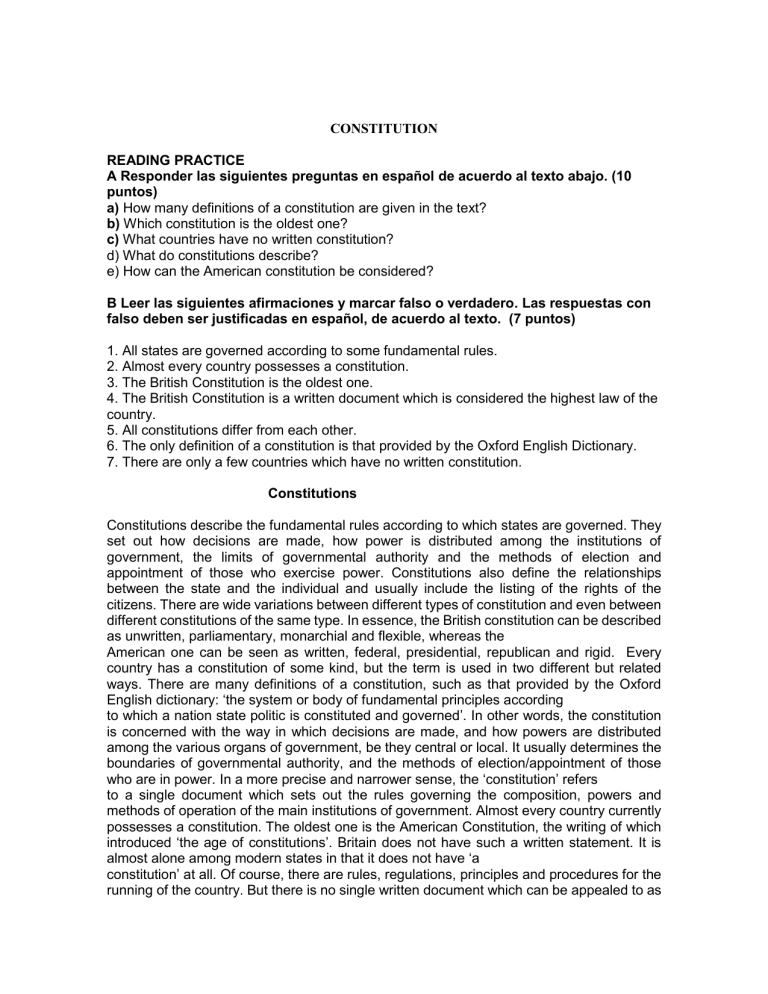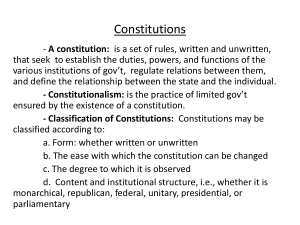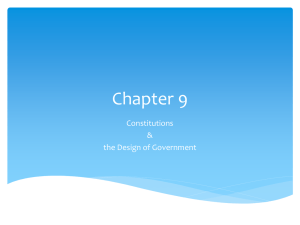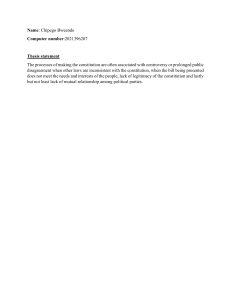
CONSTITUTION READING PRACTICE A Responder las siguientes preguntas en español de acuerdo al texto abajo. (10 puntos) a) How many definitions of a constitution are given in the text? b) Which constitution is the oldest one? c) What countries have no written constitution? d) What do constitutions describe? e) How can the American constitution be considered? B Leer las siguientes afirmaciones y marcar falso o verdadero. Las respuestas con falso deben ser justificadas en español, de acuerdo al texto. (7 puntos) 1. All states are governed according to some fundamental rules. 2. Almost every country possesses a constitution. 3. The British Constitution is the oldest one. 4. The British Constitution is a written document which is considered the highest law of the country. 5. All constitutions differ from each other. 6. The only definition of a constitution is that provided by the Oxford English Dictionary. 7. There are only a few countries which have no written constitution. Constitutions Constitutions describe the fundamental rules according to which states are governed. They set out how decisions are made, how power is distributed among the institutions of government, the limits of governmental authority and the methods of election and appointment of those who exercise power. Constitutions also define the relationships between the state and the individual and usually include the listing of the rights of the citizens. There are wide variations between different types of constitution and even between different constitutions of the same type. In essence, the British constitution can be described as unwritten, parliamentary, monarchial and flexible, whereas the American one can be seen as written, federal, presidential, republican and rigid. Every country has a constitution of some kind, but the term is used in two different but related ways. There are many definitions of a constitution, such as that provided by the Oxford English dictionary: ‘the system or body of fundamental principles according to which a nation state politic is constituted and governed’. In other words, the constitution is concerned with the way in which decisions are made, and how powers are distributed among the various organs of government, be they central or local. It usually determines the boundaries of governmental authority, and the methods of election/appointment of those who are in power. In a more precise and narrower sense, the ‘constitution’ refers to a single document which sets out the rules governing the composition, powers and methods of operation of the main institutions of government. Almost every country currently possesses a constitution. The oldest one is the American Constitution, the writing of which introduced ‘the age of constitutions’. Britain does not have such a written statement. It is almost alone among modern states in that it does not have ‘a constitution’ at all. Of course, there are rules, regulations, principles and procedures for the running of the country. But there is no single written document which can be appealed to as the highest law of the land. Nobody can refer to ‘article 6’ or ‘the first amendment’ or anything like that, because nothing like that exists. Written constitutions are important in states which have been subjected to internal dissention and upheaval over a long period. The American Constitution followed in the aftermath of the War of Independence, just as the Japanese and West German documents were devised after World War II. Most constitutions are written down and embodied in a formal document. The American one is much briefer than many, having some 7000 words, expressed in seven long articles, and a mere ten pages. Few democratic countries today have unwritten constitutions. Apart from the United Kingdom, only Israel and New Zealand lack formal documents. COMPREHENSION Escoja la palabra que complete mejor la oración de acuerdo al texto y transcriba en español las oraciones. (3 puntos) 1. Constitutions describe the fundamental rules according to which states are executed / managed / governed. 2. The constitution sets out how power is distributed / divided / organized among the institutions of power. 3. It also determines the methods of nomination / election / choice of those who are in power. 4. Today nearly all countries possess / provide / set out a constitution. 5. There is no single written document in Britain which can be discussed / appealed to / governed as the highest law of the country.






